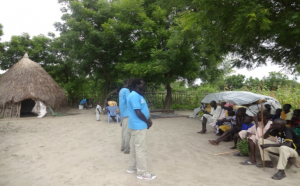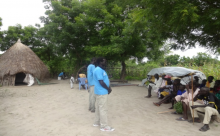WHO partners with UNIDO to close gaps in primary health care services in the Islands of Leer and Mayendit Counties, in the former Unity State of South Sudan
Juba, 18 October 2017: The conflict in South Sudan has caused a public health crisis, exacerbating underlying health vulnerabilities and weak infrastructure in the country. With the start of the current crises, a new set of challenges emerged that jeoparadized the very core foundation of the health system and its ability to meet the most basic health and nutrition needs of the population. Health systems challenges such as inadequate human resources, health care financing, essential medicines and medical supplies, among others still persist.
To bridge the gap in primary health care services, WHO in partnership with Universal Intervention and Development Organization (UNIDO) (a national NGO) is improving access to health care services for the IDPs and host communities in the Islands of Leer and Mayendit Counties.
“With funding from the United Nations Central Emergency Response Fund (CERF), the alliance between WHO and UNIDO improved care and ensured the communities receive the right care, at the right time,” said Dr Allan Mpairwe, WHO Emergency Coordinator. We look forward to delivering more initiatives through this agreement and continuing our strong commitment to improving the gaps in primary health care in hard to reach areas of South Sudan,” Dr Mpairwe highlighted.
Despite the ongoing security challenges, through the CERF supported project UNIDO established Emergency Medical Mobile teams for Tuochriak and Meer Islands, provided training on clinical case management of malaria, Acute Respiratory Infections (ARI), diarrheal diseases, and other common illnesses that are potentially fatal, as well as community based communicable disease surveillance. Since July 2017, over 4 000 consultations for diarrheoa, malaria as well as ARI took place in the facilities.
Mayendit and Leer Counties has long suffered repeated bouts of armed conflict. Access to health care services is extremely limited. Most of the health facilities are non-functional due to insecurity, conflict related destruction, damage and closure due to funding uncertainty and non-availability health work force. Continued investment and commitment is required to increase the flow of life saving supplies and services to those affected both by the conflict and by the food and nutrition crisis Dr Mpairwe underscored.
Email: mpairwea [at] who.int (mpairwea[at]who[dot]int)
Tel: , +211 955 372 370
Communications Officer
WHO Rwanda
Mobile: +250 795 450 856
Email: ebrahimj [at] who.int (ebrahimj[at]who[dot]int)




